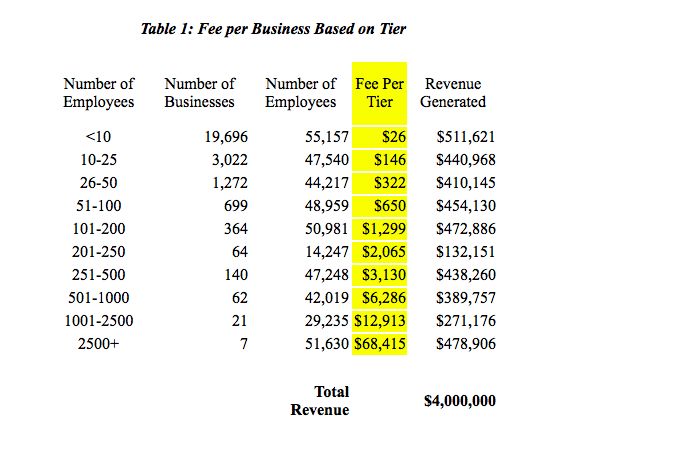Paying to Regulate Local Labor Standards with a Fee on Businesses
As we enter a period of great uncertainty about the extent to which workers’ rights will be eroded at the federal level in the coming years, the City of Seattle continues to be at the forefront of progressive cities enacting local measures to address income inequality and to protect workers from abusive employment practices. The recent secure scheduling and hotel housekeeper measures are the latest in a series of robust worker protections that are improving the lives of low-wage employees working in Seattle. These laws, all of which are enforced by the city’s Office of Labor Standards, reduce disparities in income for women, people of color, and immigrants – those communities that stand to be the hardest hit by federal labor law policy changes in the coming years.
Last week, the city council rejected a proposal by council member Lisa Herbold that would provide a dedicated funding stream for OLS’s regulatory activities through imposition of a fee on covered businesses. Critics of the measure argue that the fee is a legal risk for the city because it is, in fact, a tax subject to constitutional and statutory limitations that do not apply to regulatory fees.
However, it's not a tax.
Unlike a tax, which raises money for general government purposes, the primary purpose of revenue-generating fees like the one proposed by council member Herbold is to regulate—namely, to pay for the cost of ensuring that existing labor standards rules are complied with and enforced. Critical to enforcement of the local labor standards laws, which guarantee a $15 minimum wage, paid sick leave and freedom from wage theft, among other rights and protections, is OLS’s mandate to educate employers and workers about their rights and obligations through outreach by community-based organizations. Educating workers so they can directly engage with their employers is an incredibly cost-effective means to enforce labor standards. The monies raised are simply a tool of, and a means to implement, the city’s regulation.
Unlike tax revenues, which are directed to the city’s general fund and can be used for any public purpose, a fee may only be spent on the far more narrow regulatory purpose. Under council member Herbold’s proposal, proceeds of the fee can only be used for OLS’s regulatory functions under Seattle Municipal Code 3.14.945, which include promoting labor standards by means of outreach and education and technical assistance and training; collecting and analyzing data on the city's work force and workplaces; and administering and enforcing City of Seattle labor standards ordinances. Fees are directed to a dedicated fund for these purposes only and do not revert to the City’s General Fund.
Finally, there is a direct relationship between the labor standards fee charged and the burden produced by the business paying the fee. The proposal does not create a “head tax,” as some have argued. Rather, the fees are tiered, such that small employers pay a smaller fee while larger employers pay more. This structure corresponds with the city’s decision to enact stricter standards on minimum wage, sick leave, and scheduling for larger employers and the corollary burden produced on OLS’s enforcement activities by companies who employ more people.
The argument that calling the labor standards fee what it is—a “fee”—could jeopardize the city’s defense of Seattle’s firearm and ammunition tax is a distraction without merit. Washington courts have long distinguished between taxes and fees based on precisely the criteria discussed above. The labor standards fee and the gun tax are apples and oranges, and the effort to avoid the former because of pretended concern about the latter is just that—a pretense.
Jennifer L. Robbins is an attorney at attorney at Schwerin Campbell Barnard Iglitzin & Lavitt, LLP, a Seattle-based law firm that has been representing unions and other worker advocacy organizations since 1916. Among her clients is SEIU 775, which has been advocating for a dedicated funding stream for OLS’s education, outreach and enforcement activities to ensure broad-based compliance with Seattle’s minimum labor standards laws through a regulatory fee imposed on businesses subject to those laws.
Editor's Note: Herbold's office provided PubliCola with a chart of the fee per tier breakdown of the $4 million proposal. The chart disputes another claim in the argument that the fee is really a tax. A legal memo from the chamber of commerce argued that since Herbold's "fee" broke down to different costs per employee per tier, it couldn't possibly be paying for a regulation (the definition of a fee) because the cost of administering regulations shouldn't vary per employee. Herbold's chart shows, however, that when you break down the employee cost per tier, the charge is the same: $9.28. Simply divide the total revenue by the total number of employees in that tier.

In the meantime, the city budget approved by the council this week, did include general fund increase for OLS money from $2 million to $5.2 million.




